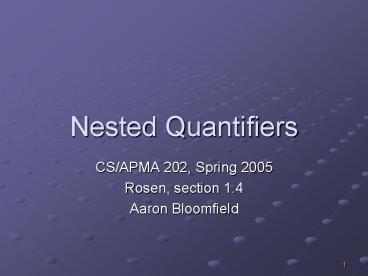Nested Quantifiers - PowerPoint PPT Presentation
Title:
Nested Quantifiers
Description:
Nested Quantifiers CS/APMA 202, Spring 2005 Rosen, section 1.4 Aaron Bloomfield Multiple quantifiers You can have multiple quantifiers on a statement x y P(x, y ... – PowerPoint PPT presentation
Number of Views:113
Avg rating:3.0/5.0
Title: Nested Quantifiers
1
Nested Quantifiers
- CS/APMA 202, Spring 2005
- Rosen, section 1.4
- Aaron Bloomfield
2
Multiple quantifiers
- You can have multiple quantifiers on a statement
- ?x?y P(x, y)
- For all x, there exists a y such that P(x,y)
- Example ?x?y (xy 0)
- ?x?y P(x,y)
- There exists an x such that for all y P(x,y) is
true - ?x?y (xy 0)
3
Order of quantifiers
- ?x?y and ?x?y are not equivalent!
- ?x?y P(x,y)
- P(x,y) (xy 0) is false
- ?x?y P(x,y)
- P(x,y) (xy 0) is true
4
Negating multiple quantifiers
- Recall negation rules for single quantifiers
- ?x P(x) ?x P(x)
- ?x P(x) ?x P(x)
- Essentially, you change the quantifier(s), and
negate what its quantifying - Examples
- (?x?y P(x,y))
- ?x ?y P(x,y)
- ?x?y P(x,y)
- (?x?y?z P(x,y,z))
- ?x?y?z P(x,y,z)
- ?x?y?z P(x,y,z)
- ?x?y?z P(x,y,z)
5
Negating multiple quantifiers 2
- Consider (?x?y P(x,y)) ?x?y P(x,y)
- The left side is saying for all x, there exists
a y such that P is true - To disprove it (negate it), you need to show that
there exists an x such that for all y, P is
false - Consider (?x?y P(x,y)) ?x?y P(x,y)
- The left side is saying there exists an x such
that for all y, P is true - To disprove it (negate it), you need to show that
for all x, there exists a y such that P is false
6
Translating between English and quantifiers
- Rosen, section 1.4, question 20
- The product of two negative integers is positive
- ?x?y ((xlt0) ? (ylt0) ? (xy gt 0))
- Why conditional instead of and?
- The average of two positive integers is positive
- ?x?y ((xgt0) ? (ygt0) ? ((xy)/2 gt 0))
- The difference of two negative integers is not
necessarily negative - ?x?y ((xlt0) ? (ylt0) ? (x-y0))
- Why and instead of conditional?
- The absolute value of the sum of two integers
does not exceed the sum of the absolute values of
these integers - ?x?y (xy x y)
7
Translating between English and quantifiers
- Rosen, section 1.4, question 24
- ?x?y (xy y)
- There exists an additive identity for all real
numbers - ?x?y (((x0) ? (ylt0)) ? (x-y gt 0))
- A non-negative number minus a negative number is
greater than zero - ?x?y (((x0) ? (y0)) ? (x-y gt 0))
- The difference between two non-positive numbers
is not necessarily non-positive (i.e. can be
positive) - ?x?y (((x?0) ? (y?0)) ? (xy ? 0))
- The product of two non-zero numbers is non-zero
if and only if both factors are non-zero
8
End of lecture on 8 February 2005
9
Rosen, section 1.4 question 30
- Rewrite these statements so that the negations
only appear within the predicates - ??y?x P(x,y)
- ?y??x P(x,y)
- ?y?x ?P(x,y)
- ??x?y P(x,y)
- ?x??y P(x,y)
- ?x?y ?P(x,y)
- ??y (Q(y) ? ?x ?R(x,y))
- ?y ?(Q(y) ? ?x ?R(x,y))
- ?y (?Q(y) ? ?(?x ?R(x,y)))
- ?y (?Q(y) ? ?x R(x,y))
10
Rosen, section 1.4 question 31
- Express the negations of each of these statements
so that all negation symbols immediately precede
predicates. - ?x?y?z T(x,y,z)
- ?(?x?y?z T(x,y,z))
- ??x?y?z T(x,y,z)
- ?x??y?z T(x,y,z)
- ?x?y??z T(x,y,z)
- ?x?y?z ?T(x,y,z)
- ?x?y P(x,y) ? ?x?y Q(x,y)
- ?(?x?y P(x,y) ? ?x?y Q(x,y))
- ??x?y P(x,y) ? ??x?y Q(x,y)
- ?x??y P(x,y) ? ?x??y Q(x,y)
- ?x?y ?P(x,y) ? ?x?y ?Q(x,y)
11
Quick survey
- I felt I understood the material in this slide
set - Very well
- With some review, Ill be good
- Not really
- Not at all
12
Quick survey
- The pace of the lecture for this slide set was
- Fast
- About right
- A little slow
- Too slow
13
Quick survey
- How interesting was the material in this slide
set? Be honest! - Wow! That was SOOOOOO cool!
- Somewhat interesting
- Rather borting
- Zzzzzzzzzzz

